Esto es lo que, de mi poesía e influencias beat, dice Estíbaliz Encarnación-Pinedo en The Routledge Handbook of International Beat Literature (Edited by A. Robert Lee):
In 2011, the independent publishing house Ediciones Baladí published Beatitud: Visiones de la Beat Generation, a book where more than thirty Spanish poets, writers and artists pay tribute to the American movement. In addition to being a “subjective, intimate and strictly literary tribute that openly acknowledges the influence and debt” to the Beat Generation, this anthology also attests to the “aesthetic and even vital debt” to Beat writing of the two different generations to which the editors, Vicente Muñoz Álvarez (1966) and Ignacio Escuín Borao (1981), belong. Moreover, the collection is a reminder that the influence of the Beat Generation is not restricted to the transitional poets, but extends to younger generations. The poets included in this section, Vicente Muñoz Álvarez (1966), Uberto Stabile (1959) and Antonio Cordero Sanz (1963 ), gie ready testimony.
A Beat attitude underlies Vicente Muñoz Álvarez’s playfulness in early poems like “Panteista” / “Pantheistic” – “Pereira dice / que no es pecado / soñar que a Dios / le gusta el vino. / Pero… / ¿Es pecado soñar / que el vino es Dios?” (Poemash nº1). / “Pereira says / that it is not a sin / to dream God / likes wine. / But… / Is it a sin to dream / God is wine?” A very Beat irony is also present in the poet’s representation of restlessness and inconformity in “Uno de Tantos” / “One among Many”, where the unemployed, rebel-to-be still living at his parents’ performs his un-conformity through the following commandments:
Leer a Miller
o a Bukowski
o a Kerouac. […]
Llevar el pelo largo.
Sacar a pasear al perro.
Follar de vez en cuando.
Ir a ver exposiciones
Deprimirse.
*
Read Miller
or Bukowski
or Kerouac […]
Wear Long Hair.
Walk de dog.
Fuck every once in a while.
Attend exhibitions.
Get depressed.
Read Miller
or Bukowski
or Kerouac […]
Wear Long Hair.
Walk de dog.
Fuck every once in a while.
Attend exhibitions.
Get depressed.
A much more dramatic tone is adopted in “Crónicas de Fin de Siglo” / “End of the century chronicles”, where the young poet describes the desolation of a lost generation whose “única aspiración era soportar la vida” (Canciones de la Gran Deriva) / “sole aspiration was to endure life”. Although in works like Marginales (2013) Álvarez turns to fictionalized discourse, his work is highly autobiographical and the language is often colloquial and conversational. A candid portrayal of the poet’s life can be found in “Animales Perdidos”, the first poem in a collection under the same title which situates the speaker in a very personal hell – “No eran buenos tiempos. / Me acababa de separar de mi mujer / y había tenido que dejar mi casa en el campo” / “I had seen better days. / I had just separated from my wife / and had to move out of my house in the countryside”. This private hell becomes increasingly universal through the fragmentary images of decay of poems like “Sujeto de Experimentación” / “Human Experimentation”, where the world enumerates into a set of catastrophies; or “Barrio”, where the urban landscape turns aggressive and threatening to the individual. Six decades after “Howl”, Álvarez’s vision of society is shockingly similar to the one portrayed by Ginsberg – “en fila india / confundidos / desilusionados / ciegos / víctimas / del consumismo / del capitalismo / del desempleo” (“Cola para Genocidio” / “In a single file / confused / disillusioned / blind / victims / of consumerism / of capitalism / of unemployment” (“Genocide Queueing”). In other poems, revisiting Kerouac’s poetics of movement, Álvarez adapts the American road to fit his commercial route as an “on the road” shoe seller. “[D]isfrazado / de hombre cuerdo” (“Días de Ruta”) / “In a disguise/ of sanity”, the poet chronicles Spain’s economic crisis:
naufragamos
llueve no vendemos
liquidamos rebajamos
no podemos nos hundimos
esperamos nos forzamos
declinamos cerramos
*
We go under
it rains we don't sell
we clear out we go on sale
we can't we sink
we wait we make an effort
we go into decline we close
*
We go under
it rains we don't sell
we clear out we go on sale
we can't we sink
we wait we make an effort
we go into decline we close
In this nightmarish scenario, poetry becomes the only salvation. Even if words are a double-edged sword in “Carnívoras” / “Carnivorous” – a poem dedicated to William Burroughs – Álvarez is plain sailing in his advice: “agarra / fuerte / el poema / será / tu salvaguarda / y guía” / “Hold on / tight / to the poem / it will be / your safeguard / and guide”.







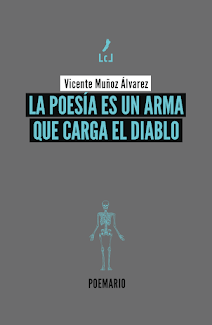











































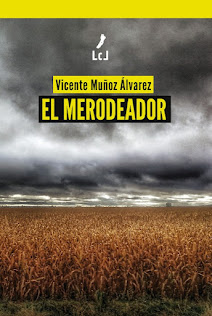




























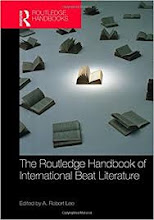

























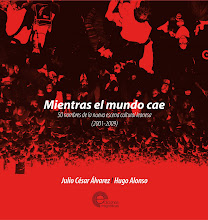








.jpg)



















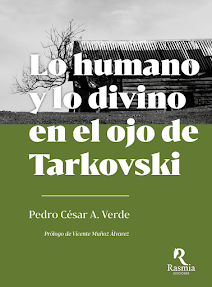























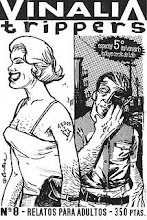



































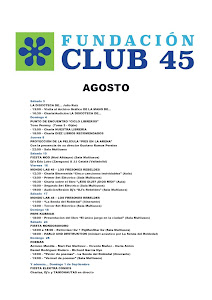
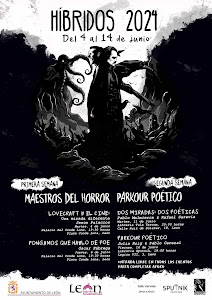

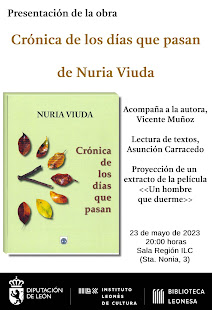
























































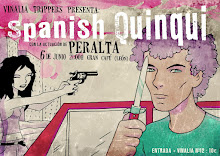

























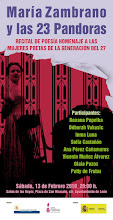























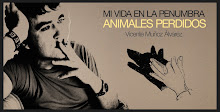


No hay comentarios:
Publicar un comentario